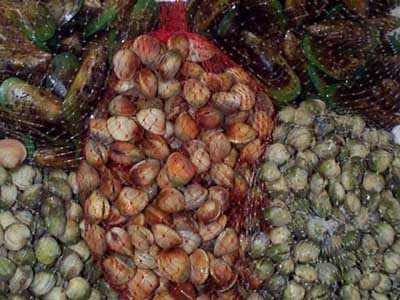'Our Life is Bloody Hard Here'
Last week 19 people, most Chinese, died while picking cockles in Morecambe Bay. What drives migrant workers to take such risks? Jonathan Watts reports from Fujian province.
By Guardian Newspapers, 2/8/2004
Grief is nothing new to the parents of Baihu village, whose children risk everything to work illegally in Britain and other wealthy parts of the world so that they can fend for their impoverished families in China.
Four years ago, 58 of their sons and daughters suffocated in the back of a lorry bound for Dover from Zeebrugge in Belgium. Today, like many others in Fujian, they are again having to steel themselves for the possibility of more tragic news after the drowning of 19 Chinese cockle pickers in Morecambe Bay on Friday, several of whom are believed to have come from the province.
On a winter day of grey skies, bitter rain and biting winds, the shell-laden beaches near Baihu are not unlike the sands of Morecambe. But the similarity ends there.
Baihu is among the most squalid places in China - a village of rutted roads, dank housing and washing lines filled with torn children's clothing. It is a place the Chinese economic miracle has passed by. Since the closure of several factories in the 1990s, locals estimate the unemployment rate to be over 50%. Most families, they say, depend on a son or a daughter who is working illegally overseas.
For those with a child in Britain, the news of the latest deaths simply adds to the ever-present worries of a community that has long faced the choice of grinding poverty at home or a risky illegal existence overseas.
Nobody knows the pain of this dilemma more than the Huo family. Their 24-year-old son was one of only two survivors from the Dover tragedy. He is still living illegally in Britain, but his parents say they don't know where.
"I will probably never see my son again," says Mrs Huo. "There is nothing I want more than his safe return, but he's illegal so he cannot come back."
His presence, however, is still very evident in the house. The floor, the ceiling and the single light bulb are all bare, but the grey concrete walls have two decorations: a picture of Jesus Christ and a photograph of the distant son wearing a No 10 England shirt.
It was not because of a love of Michael Owen that the young Huo went to England. "There was a gang of them that just took off without telling anyone," said a neighbour. "I doubt if they even knew which country they were going to. They just wanted to get away."
It is not hard to see why. Fewer than 100 metres from the Huo household, a 70-year-old woman fills two buckets full of water from a standpipe and then carries them with a bamboo pole across her shoulders back to her home, a wooden shack with no glass in the windows.
"Our children leave because life is bloody hard here," says a man in his 60s, whose son has been working illegally in Britain for three years. "He doesn't tell me where he is or what he does, but he sends money home and for that I'm grateful."
For the old man and his wife, who live on less than £20 a month, that income can make the difference between survival and destitution. That much is apparent from the families who lost an overseas breadwinner in Dover.
The Ke household never recovered - emotionally or economically - from the death of their only son in that tragedy. Despite borrowing to buy a fishing boat, they were never able to achieve self-sufficiency and had to leave Baihu last year so that their two daughters could work in a factory in a neighbouring province.
They weren't able to get over the loss of their son," said a neighbour. "They tried to get by with almost no income, but they couldn't do it."
Others are in the same situation. Since the main employer, a state-owned textile factory, closed as part of China's modernisation drive, local residents count themselves lucky to find a production line job that pays 1,000 rmb (£66) a month.
With prospects so poor, many young people risk contacting snakehead gangs to smuggle them overseas. According to locals, the price of passage to the US or Europe is 500,000 to 600,000 rmb (£33,000-£40,000), usually repaid through indentured servitude as waiters, dishwashers and laundry workers.
In the wake of the Dover tragedy, governments in Britain and China have tightened border controls. Beijing is in the midst of a campaign to crack down on snakehead activities, evident in slogans daubed on Baihu walls in giant red characters: "Strike hard against illegal emigration."
Chinese newspaper coverage of Morecambe's "devil beach" contained grateful reports of the efforts made by Britain's emergency services, but Baihu residents also expressed anger at the fundamental problem of global inequality that placed so many Chinese workers at such risk so far from home.
"You ask why they didn't stay here and work," said a young woman carrying a baby. "It's because there is no work. In Britain, people have money. In China, people don't have money. It's very simple."
© Guardian Newspapers Limited
 Originally posted by elindra:Cockles are the only shellfish I don't eat
Originally posted by elindra:Cockles are the only shellfish I don't eat
 Originally posted by SGpork:then i should say...
Originally posted by SGpork:then i should say...












